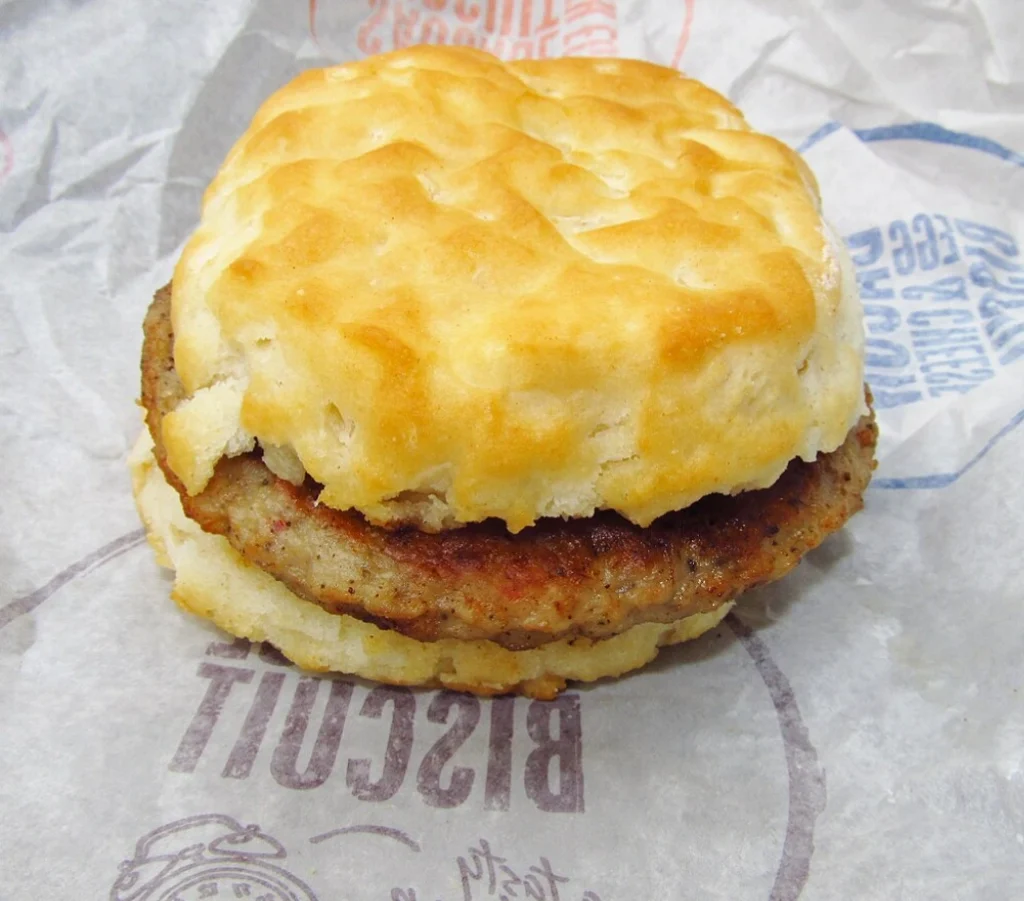Breakfast sandwiches like the sausage egg and cheese biscuit are a beloved staple for many on-the-go eaters. They’re warm, hearty, and packed with protein. But how healthy is a sausage egg and cheese biscuit really? While this classic fast-food item might be tasty and convenient, its nutritional profile tells a more complex story. From calorie content to sodium concerns, this article dives deep into what you’re really eating when you enjoy a sausage egg and cheese biscuit. We’ll also explore healthier alternatives and tips for making better breakfast choices without sacrificing flavor.
Let’s begin by understanding what a sausage egg and cheese biscuit really is and why it’s such a popular choice.
Overview of the Sausage Egg and Cheese Biscuit
What is a Sausage Egg and Cheese Biscuit?
The sausage egg and cheese biscuit is a breakfast sandwich made up of a savory sausage patty, a fluffy egg, and melted cheese, all tucked inside a buttery biscuit. It’s a fast-food favorite across the country. But many wonder, how healthy is a sausage egg and cheese biscuit? This sandwich may deliver protein and energy, but it also comes with a hefty calorie count, high sodium, and other nutritional concerns.
Origins of the Breakfast Sandwich
The breakfast sandwich as we know it has humble beginnings. It traces back to the early 20th century when portable meals became increasingly essential for workers. Biscuits, a Southern favorite, were adapted into sandwich form, adding sausage, eggs, and cheese for a heartier meal. Fast food restaurants capitalized on this concept, and by the 1970s, chains like McDonald’s introduced their breakfast menus to meet demand.
Over time, the sausage egg and cheese biscuit became an iconic menu item, especially in regions where biscuits are a culinary tradition. Today, it’s not just a Southern staple, it’s a nationwide breakfast favorite.
Nutritional Breakdown of a Sausage Egg and Cheese Biscuit
Calories and Macronutrients
When it comes to the sausage egg and cheese biscuit, its calorie count is one of the first things people notice. On average, this breakfast sandwich packs between 500 to 600 calories, depending on the fast-food chain and portion size. For instance, McDonald’s Sausage Biscuit with Egg contains approximately 530 calories, while Chick-fil-A’s version is slightly higher due to the richer, buttery biscuit.
From a macronutrient perspective, a typical sausage egg and cheese biscuit contains:
- Protein: Around 15-20 grams, thanks to the egg and sausage.
- Fat: A substantial 30-40 grams, much of it saturated fat from the sausage and cheese.
- Carbohydrates: About 35-45 grams, largely from the biscuit.
Although the sandwich does offer a decent protein boost, it raises the question: how healthy is a sausage egg and cheese biscuit when considering its high fat and calorie content?
Key Ingredients and Their Health Impact
Each component of a sausage egg and cheese biscuit contributes differently to its nutritional value—and its drawbacks:
- Sausage: While it’s a good source of protein, sausage is highly processed and loaded with saturated fats, sodium, and preservatives. Overconsumption can raise cholesterol levels and increase the risk of heart disease.
- Eggs: Eggs are one of the healthier components, offering protein, vitamins, and minerals. However, fried eggs (often used in these sandwiches) can contain added fats.
- Cheese: Cheese provides calcium and protein but also adds saturated fat and extra calories.
- Biscuit: The biscuit is often the least nutritious part, as it’s made from refined flour and butter, which means it’s high in empty calories and fats.
While the sausage egg and cheese biscuit is undeniably satisfying, its balance leans heavily toward fat and sodium rather than fiber or essential nutrients.
Sodium and Cholesterol Concerns
Sodium is another significant concern with the sausage egg and cheese biscuit. A single serving can contain over 1,200 milligrams of sodium—half the recommended daily intake for most adults. This raises the question: how healthy is a sausage egg and cheese biscuit when considering its impact on sodium levels? Excessive sodium intake can lead to high blood pressure, heart disease, and kidney issues.
Additionally, the high levels of saturated fat contribute to increased cholesterol, further elevating cardiovascular risks. In short, while enjoying this sandwich occasionally may be fine, making the sausage egg and cheese biscuit a daily habit could negatively impact your health.

Comparing Sausage Egg and Cheese Biscuits Across Fast Food Chains
McDonald’s Sausage Biscuit with Egg
McDonald’s version of the sausage egg and cheese biscuit remains one of the most popular breakfast items. It contains approximately 530 calories, 35 grams of fat, and 1,150 milligrams of sodium. While it’s protein rich, its high sodium content makes it a less than ideal choice for those with heart or blood pressure concerns.

One advantage is its accessibility, it’s available at nearly every McDonald’s location and is relatively affordable. However, the refined biscuit and fatty sausage keep it firmly in the “indulgent treat” category.
Chick-fil-A’s Sausage Egg and Cheese Biscuit
Chick-fil-A’s take on the classic breakfast sandwich is slightly larger and richer, with about 600 calories and 36 grams of fat. Their biscuits are known for being buttery and fluffy, which enhances flavor but adds extra calories. Sodium content is also high, hovering around 1,250 milligrams.
While Chick-fil-A positions itself as a healthier fast-food option overall, its sausage egg and cheese biscuit doesn’t quite meet that mark. That said, Chick-fil-A does offer smaller or grilled alternatives that are lighter on calories and fat.
Wendy’s Sausage, Egg & Cheese Biscuit
Wendy’s version comes in at about 550 calories, similar to its competitors. However, Wendy’s biscuit tends to be slightly larger and flakier. Sodium levels remain high, around 1,200 milligrams, and fat content is comparable.
Wendy’s breakfast menu emphasizes fresh ingredients, which can be a slight advantage, but ultimately, the nutritional breakdown mirrors its rivals.
Across the board, sausage egg and cheese biscuits from major fast-food chains offer similar nutritional profiles. Each sandwich is high in calories, fat, and sodium, with only minor differences in portions or biscuit quality. While they may be delicious and convenient, healthier options are worth exploring.
Health Risks Associated with Sausage Egg and Cheese Biscuits
Impact on Cardiovascular Health
While the sausage egg and cheese biscuit is undeniably tasty, its nutritional drawbacks make it less heart friendly. The high levels of saturated fats from the sausage and cheese can contribute to raised LDL (“bad”) cholesterol levels. This raises an important question: how healthy is a sausage egg and cheese biscuit when it comes to heart health? Elevated cholesterol is a major factor for cardiovascular disease, which remains one of the leading causes of death globally.
Moreover, the sodium content often exceeding 1,200 milligrams per serving—adds to the health risks. Excess sodium increases blood pressure, placing added stress on your heart and arteries. Over time, this can lead to hypertension, stroke, or even kidney damage.
High Sodium and Processed Meat Risks
Sausage, a staple ingredient in the sandwich, is classified as a processed meat. According to health experts, consuming processed meats regularly has been linked to higher risks of cancer, particularly colorectal cancer. The preservatives and nitrates found in these meats may also harm long-term health.
In addition, sodium from both the sausage and biscuit contributes significantly to your daily intake. To put it in perspective, a sausage egg and cheese biscuit can take up half—or more—of the daily recommended sodium allowance in a single serving. For individuals with heart issues or kidney concerns, such high sodium levels are particularly problematic.
Weight Gain and Obesity
Calories matter, and with 500 to 600 calories per serving, the sausage egg and cheese biscuit isn’t exactly waistline-friendly. Combined with its high fat and low fiber content, this breakfast choice can leave you feeling hungry sooner, leading to overeating throughout the day.
While occasional indulgence is perfectly fine, making this sandwich part of your regular breakfast routine could contribute to weight gain, obesity, and metabolic issues. Balancing your meal choices with nutrient dense options is key to staying healthy.
Are There Any Nutritional Benefits?
Protein Content and Energy Boost
Despite its downsides, the sausage egg and cheese biscuit does offer some benefits, especially for its protein content. With around 15-20 grams of protein per serving, it provides a solid energy boost to kickstart your morning. Protein is essential for building muscles, maintaining satiety, and supporting overall body functions.
The egg in the sandwich is also a nutritional powerhouse, providing essential amino acids, vitamins, and minerals like Vitamin D and B12. These nutrients support bone health, energy production, and brain function. If you’re active or need fuel for a busy day, the protein in the sandwich can be a positive.
Micronutrients in Eggs and Cheese
Eggs and cheese add small amounts of beneficial nutrients like calcium, phosphorus, and selenium. Calcium is crucial for strong bones and teeth, while phosphorus aids in energy metabolism. Selenium acts as an antioxidant, helping to protect your cells from damage.
However, the benefits come in small doses and don’t outweigh the high fat and sodium content of the sausage egg and cheese biscuit. If you’re looking to maximize nutrients without the downsides, consider modifying this sandwich with healthier alternatives (like leaner meats or whole grain biscuits).
Want to try a homemade version with healthier ingredients? Check out this related guide: How to Make Sausage Egg and Cheese Muffins. This recipe offers a delicious twist while giving you more control over the nutritional profile.
Healthier Alternatives to Sausage Egg and Cheese Biscuits
Low-Calorie Breakfast Options
If you love the taste of a sausage egg and cheese biscuit but want to make healthier choices, don’t worry there are better alternatives. Many fast-food chains now offer lighter versions of their breakfast sandwiches. For example, swapping the sausage for turkey sausage or lean ham can significantly reduce the fat and sodium content. Turkey sausage offers similar flavor with fewer calories and less saturated fat.
Egg white sandwiches are another great option. By using only the egg whites, you cut down on cholesterol and calories while keeping the protein intact. Pair this with a whole-grain English muffin instead of a biscuit, and you’ve got a more balanced meal that still satisfies.
DIY Healthier Breakfast Sandwiches
Making your own breakfast sandwiches at home is the best way to control ingredients and calories. Start with a whole-wheat English muffin or thin whole-grain bread for added fiber. Replace the traditional sausage with lean turkey sausage, grilled chicken, or even a veggie patty for a plant-based option.
For eggs, you can scramble egg whites or mix whole eggs with spinach, tomatoes, or bell peppers for an extra nutritional punch. Add a slice of low-fat cheese for flavor, and you’ll have a healthier version of the sausage egg and cheese biscuit that’s just as satisfying.
By preparing your breakfast at home, you not only save calories but also avoid hidden preservatives and excessive sodium found in fast-food versions.
FAQs About Sausage Egg and Cheese Biscuits
How many calories are in a typical sausage egg and cheese biscuit?
A typical sausage egg and cheese biscuit contains between 500 to 600 calories, depending on the restaurant. McDonald’s version has around 530 calories, while Chick-fil-A’s is slightly higher at 600 calories. These sandwiches are calorie-dense, so eating them regularly may impact weight goals.
Can you eat a sausage egg and cheese biscuit on a diet?
Yes, but moderation is key. If you’re following a calorie-controlled or low-fat diet, enjoy the sausage egg and cheese biscuit as an occasional treat. Consider healthier modifications like opting for turkey sausage, egg whites, or a whole-grain biscuit to make it fit your goals better.
What are some healthier substitutes for sausage in breakfast sandwiches?
Healthier substitutes include turkey sausage, lean ham, grilled chicken, or plant-based patties. These alternatives provide protein while reducing saturated fat and sodium content. Adding vegetables like spinach or tomatoes can further boost the meal’s nutritional value.
For more tips on creating healthier breakfasts, explore recipes like our guide on Sausage Egg and Cheese Muffins. It’s perfect for those looking to enjoy a tasty but lighter morning meal.

Finding Balance with the Sausage Egg and Cheese Biscuit
Balancing Taste and Health
The sausage egg and cheese biscuit is a flavorful and convenient breakfast option, but it’s far from the healthiest choice. With high calories, saturated fats, and sodium levels, it can pose health risks when consumed regularly. However, the sandwich does offer benefits like protein and energy, making it fine for occasional indulgence.
If you’re wondering, how healthy is a sausage egg and cheese biscuit? The answer depends on how often you eat it and whether you can make healthier modifications. Choosing leaner proteins like turkey sausage, swapping refined biscuits for whole-grain options, or preparing a homemade version can help you strike a balance between taste and nutrition.
Final Thoughts on Making Better Choices
While fast food options are tempting, there are always ways to enjoy breakfast without sacrificing your health goals. Preparing your own sausage egg and cheese muffin at home gives you full control over ingredients, calories, and quality. Swapping in healthier alternatives, like spinach, low-fat cheese, or egg whites, can elevate this beloved breakfast while keeping it nutritious.
In summary, enjoying a sausage egg and cheese biscuit occasionally won’t derail a healthy lifestyle, but moderation is key. For a lighter and equally satisfying alternative, try experimenting with healthier recipes at home and enjoy a nutritious start to your day.

